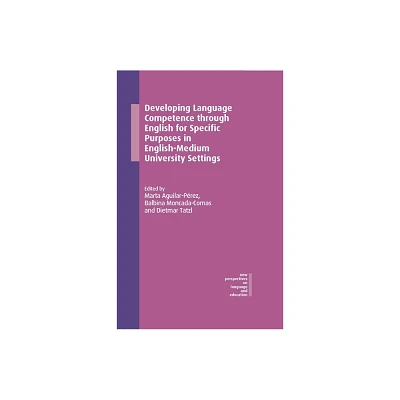Home
English-Medium Instruction Turkish Universities: Policies, Practices, and Perceptions
Loading Inventory...
Barnes and Noble
English-Medium Instruction Turkish Universities: Policies, Practices, and Perceptions
Current price: $66.99


Barnes and Noble
English-Medium Instruction Turkish Universities: Policies, Practices, and Perceptions
Current price: $66.99
Loading Inventory...
Size: Hardcover
*Product Information may vary - to confirm product availability, pricing, and additional information please contact Barnes and Noble
In response to the growing use of English as an international language, the number of English-medium instruction (EMI) programs in higher education has increased. However, decisions to implement EMI programs are often made through top-down policymaking processes with little consideration for the educational issues surrounding language policy changes.
This book examines the variation with which EMI is implemented at universities in Turkey through a multilevel empirical investigation of policies, practices, and perceptions. In addition to providing a sociohistorical overview of EMI in Turkey, the book draws on a dataset that includes policy documents, classroom observations, interviews with teachers, and focus group discussions with students. Despite national policies which envision a "one-language-at-a-time" model of EMI education, this book argues that EMI is neither English-only nor English-always in practice. By highlighting the variation with which EMI is implemented at and across Turkish universities, this study illustrates the need for more comprehensive EMI policies and processes aimed at integrating content and language learning in higher education.
Implications are discussed with respect to policy planning, program development, and pedagogical support and will be relevant for researchers and postgraduate research students interested in EMI, particularly in the Turkish context.
This book examines the variation with which EMI is implemented at universities in Turkey through a multilevel empirical investigation of policies, practices, and perceptions. In addition to providing a sociohistorical overview of EMI in Turkey, the book draws on a dataset that includes policy documents, classroom observations, interviews with teachers, and focus group discussions with students. Despite national policies which envision a "one-language-at-a-time" model of EMI education, this book argues that EMI is neither English-only nor English-always in practice. By highlighting the variation with which EMI is implemented at and across Turkish universities, this study illustrates the need for more comprehensive EMI policies and processes aimed at integrating content and language learning in higher education.
Implications are discussed with respect to policy planning, program development, and pedagogical support and will be relevant for researchers and postgraduate research students interested in EMI, particularly in the Turkish context.


















